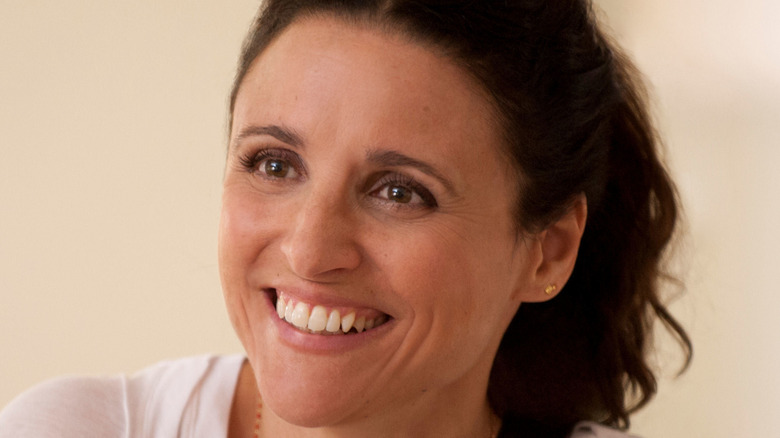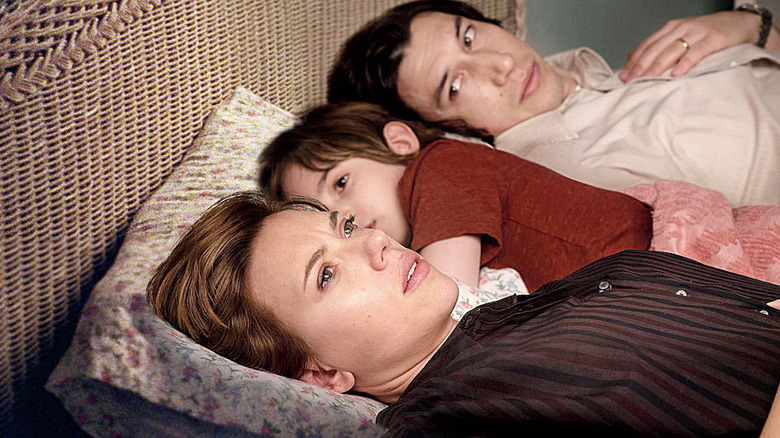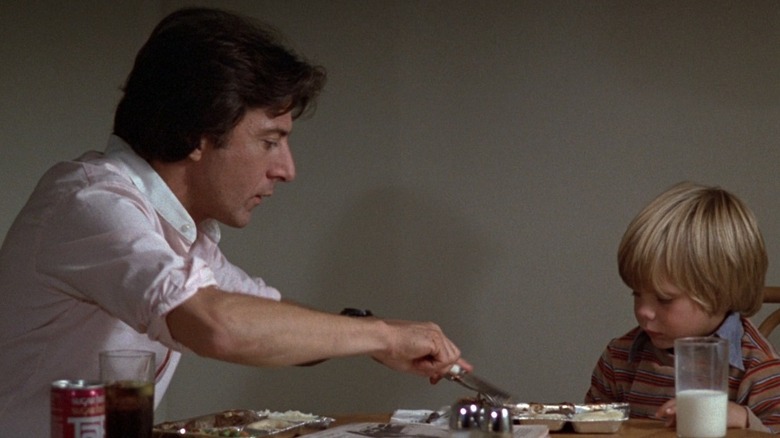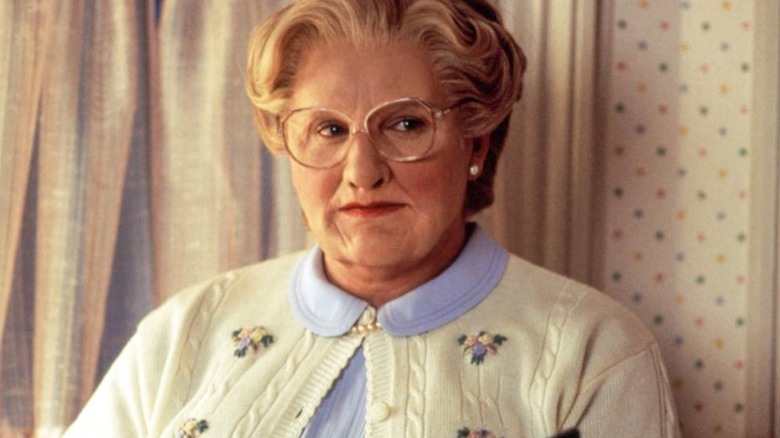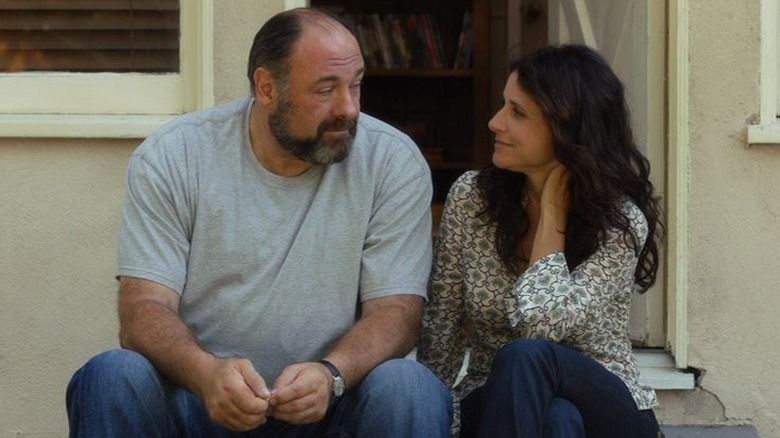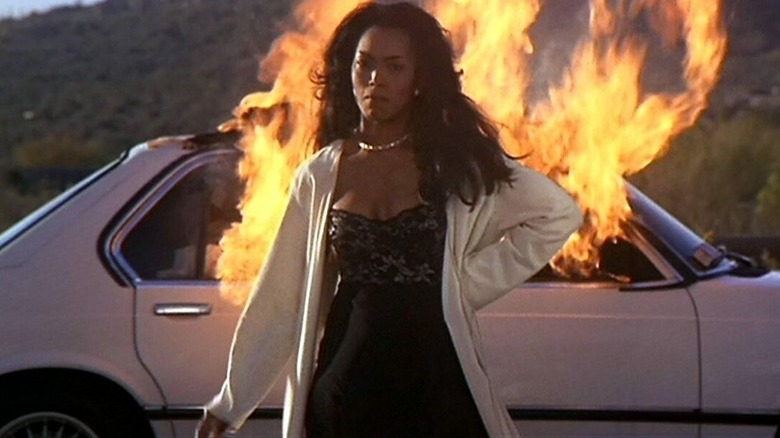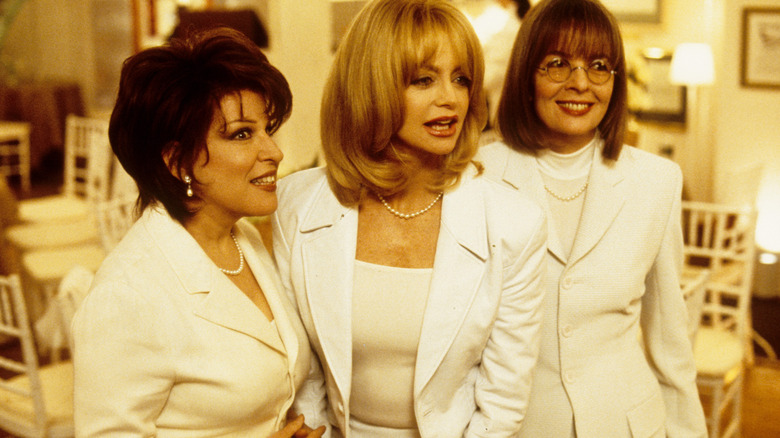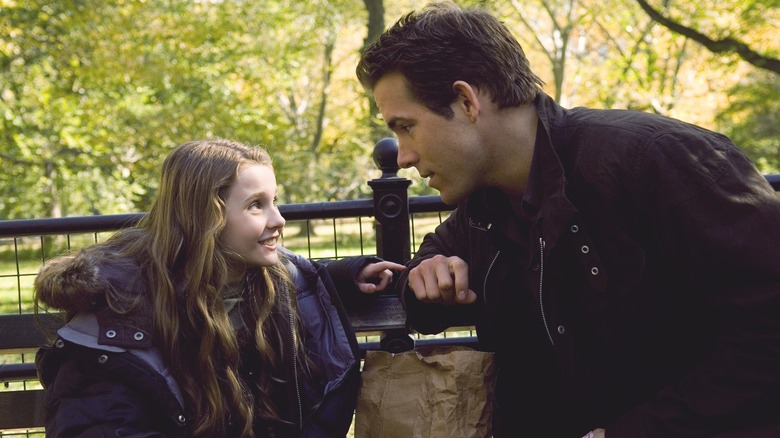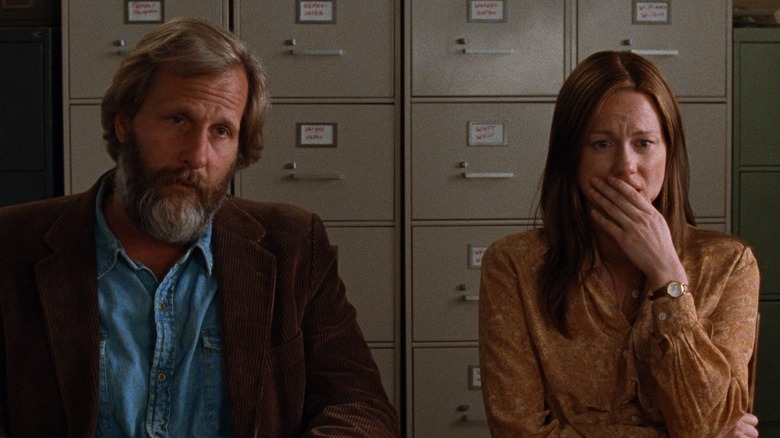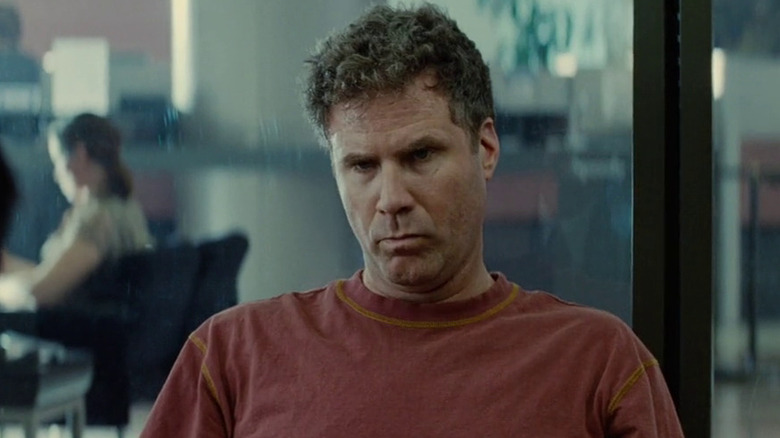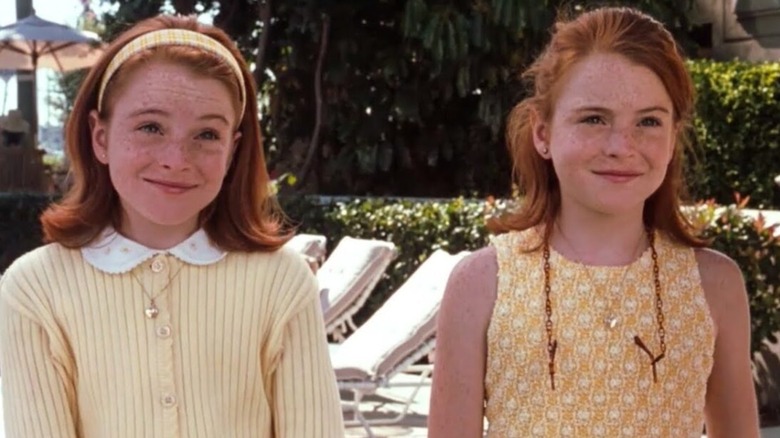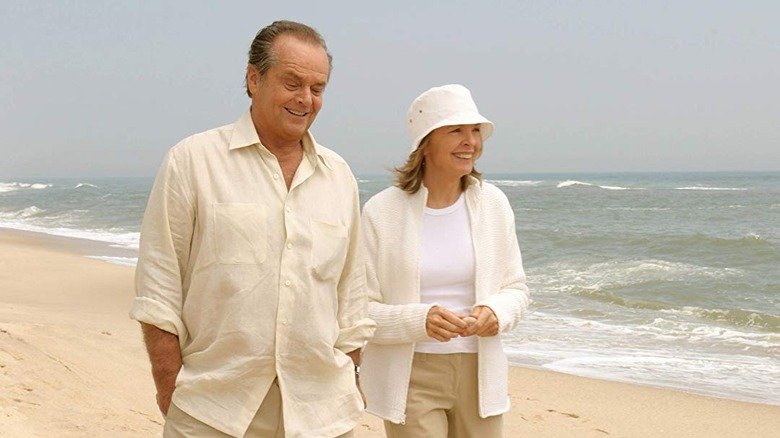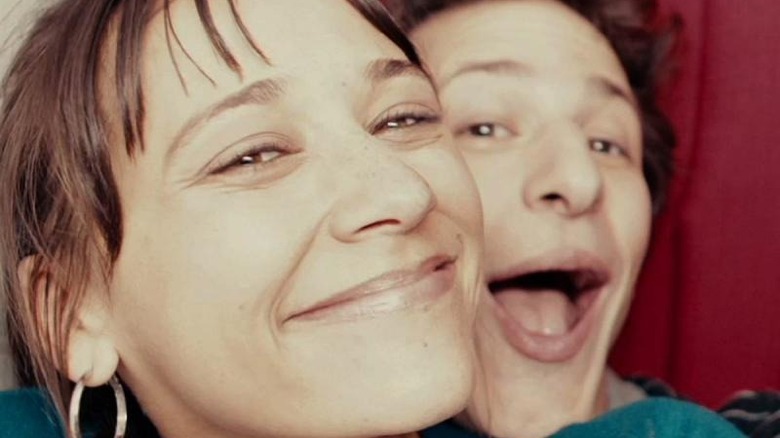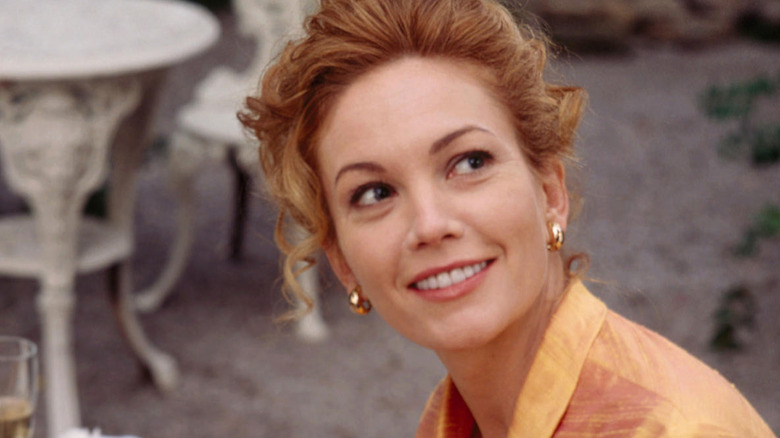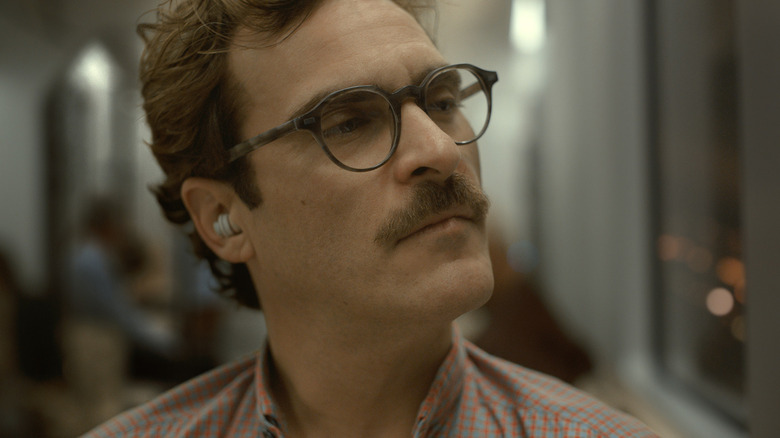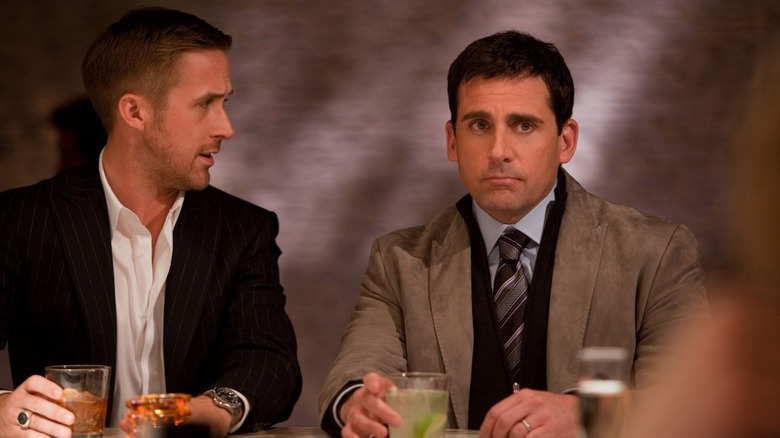The 15 Best Movies About Divorce You Should Watch Next
As delicate a topic as divorce used to be in our society, it's become more and more discussed and acceptable over the years. It's not that shocking to hear about marriages ending anymore — whether it's our own or someone else's — and we have learned to treat them accordingly as a difficult part of life rather than something shameful. As the conversation around divorce has changed personally and culturally, so too has its representation changed in the media, as filmmakers have taken different approaches in dissecting the subject and sharing their specific views about it on-screen.
While Hollywood has a complicated history with showing divorce on-screen — the censorship of the Hays Code Era from the '30s to the '60s meant it was barely shown for decades (via Film School Cred) — the movies that do center around the subject fill a welcome and necessary role of helping viewers who have gone through the painful experience of separating.
In the post Hays Code years, acclaimed features like "Kramer vs. Kramer" paved the way for the sub-genre by offering vastly different approaches to a theme that had been rendered mostly in rom-com form or not at all. Whether it's a dead-serious, incisive, and emotional drama that digs to the core of unsuccessful marriages or a light-hearted, funny, and satirical comedy that provides a release for divorcees, good films about divorce easily find their target audience in today's social climate.
Here, we gathered some of the best ones that cover the topic from various and intriguing angles.
Marriage Story
Noah Baumbach's 2019 drama "Marriage Story" meticulously portrays the end of a marriage and the separation process from both partners' perspectives. Charlie (Adam Driver) is a theater director and his wife Nicole (Scarlett Johansson) is an actress. The two live in New York and have a young son named Henry (Azhy Robertson). Their relationship is on the rocks and when Nicole gets offered a role on a TV show in Los Angeles, she decides to go there with Henry. Charlie's new play is a success, so he stays in New York, but when he goes to visit Nicole and Henry, he's surprised to find that she wants a divorce. The two agree to see a mediator but eventually go through with the separation and begin a custody battle over Henry.
"Marriage Story" stands out because of its intimate, personal approach. Baumbach went through a divorce from his ex-wife Jennifer Jason Leigh in 2013 (via Today) and although he told The New York Times that "I couldn't write an autobiographical movie if I tried," the film still includes a lot of experience from his own life. "Marriage Story" has Baumbach's trademark quirks and style, but it's also grounded, as we get to see how the husband and the wife cope with the separation both separately and together and how they view their relationship and attempt to maintain it after splitting up.
"Marriage Story" was nominated for six Oscars and won one for best performance by an actress in a supporting role for Laura Dern. It's a truly fantastic — if painful — drama that captures the details of going through a divorce.
Kramer vs. Kramer
Robert Benton's Oscar-winning drama "Kramer vs. Kramer" was definitely ahead of its time in 1979. In an age when divorce was considered a shameful embarrassment, Benton had the courage to address it and, more importantly, show how it affected a young child caught in the middle.
Ted (Dustin Hoffman) is an advertising executive in New York, who's obsessed with his job and neglects his duties as a parent and a husband. Fed up with his absence and the unequal share of household duties, Ted's wife Joanna (Meryl Streep) leaves him and their son Billy (Justin Henry). Ted has to learn how to cope with the situation as a single parent — which largely affects his work performance — and become the kind of father he's never been before. But just as Ted and Billy get used to being together, Joanna returns and demands a divorce and custody over his son. That's when things turn ugly in the courtroom and at home, as the two get locked in a battle of a devastating divorce.
It's hard to find a more iconic movie about separation and custody than "Kramer vs. Kramer." Dustin Hoffman and Meryl Streep both deliver impeccable performances (each won an Academy Award for their respective roles) and the script also smartly portrays all sides with equal importance. It's no coincidence it won numerous awards and is regarded as a classic that painstakingly deals with social issues such as mother and father's rights, feminism, and being a single parent.
Mrs. Doubtfire
It might be a stretch to call a movie that features Robin Williams dressed as an elderly woman important, but Chris Columbus' 1993 comedy "Mrs. Doubtfire" was a box office success for a reason.
Daniel Hillard (Williams) is an irresponsible and freshly unemployed voice actor, who finds himself in a custody battle after his wife Miranda (Sally Field) files for divorce. Despite the fact that he's a good father to his three children, given his current (un)employment status, the court grants sole custody of the kids to Miranda. Daniel is given the option of shared custody if he's able to find a steady job.
While Daniel tries to get his life together, he struggles to not have any custody over his kids. So, when he finds out that Miranda is looking for a housekeeper, Daniel comes up with an unusual solution to the problem of not being allowed to see his children. With his voice-acting skills and the help of his makeup artist brother, he pretends to be a British nanny called Mrs. Euphegenia Doubtfire and gets hired for the position.
As silly and unrealistic as its plot is, "Mrs. Doubtfire" manages to be a heartfelt and moving portrayal of a divorced man behind all the makeup and prosthetics. Williams' unique and unmatched comedic skills did a lot of the heavy lifting to make this flick a major box office success, as it landed at the No. 5 biggest domestic hit in 1993. Thanks to Williams' frenetic performance combined with its representation of a family changing — often unwillingly — in the face of divorce, "Mrs. Doubtfire" works and is a classic in the sub-genre for many fans.
Enough Said
Nicole Holofcener's sweet dramedy, "Enough Said," features one of the last roles of James Gandolfini before his untimely death in 2013. If you're a Gandolfini fan, this indie is a must-watch, as the actor takes on a role that's the opposite of Tony Soprano: He's a heart-warming, middle-aged man, who's looking to date again after his separation.
Eva (Julia Louis-Dreyfus) and Albert (Gandolfini) are two single divorcees, who are introduced to each other at a party by mutual friends. Albert asks her out and although Eva initially doesn't feel attracted to him, she says yes to a date. Things start getting complicated when massage therapist Eva realizes that her new client Marianne (Catherine Keener) happens to be Albert's ex-wife. As Eva and Marianne quickly become friends, Marianne unloads about every bad characteristic of her former husband. It's a double-edged sword for Eva, who relishes the insight, but is also now falling for Albert and struggling to see him through her own eyes.
"Enough Said" is a lovely, quirky, and smart dramedy in which Gandolfini shows off his softer side. The chemistry between him and Louis-Dreyfus is undeniable, as they both find companionship in an unexpected place and moment. The movie portrays the aftermath of a divorce with great accuracy, as we get to see Albert from his perspective and from his ex-wife's, and the way that Eva is caught between the two, which is as funny as it is emotional.
Waiting to Exhale
Based on Terry McMillan's novel of the same name, "Waiting to Exhale" follows a close group of friends: Savannah (Whitney Houston), Bernadine (Angela Bassett), Robin (Lela Rochon), and Gloria (Loretta Devine). Savannah and Robin are the mistresses of married men, while Bernadine and Gloria struggle to find their paths after their marriages end. The four greatly support each other emotionally by being there for one another and helping each other to live their best lives and find someone who truly deserves them.
In 1995, "Waiting to Exhale" was Forest Whitaker's feature debut as a director, and it was a financial hit at the box office. While critics didn't necessarily love the movie unconditionally, it did receive some rather good reviews. Over time, "Waiting to Exhale" has become a comforting and empowering film for those who share similar struggles like heartache, divorce, and infidelity and for many, it offers an important look at African American women going through these things (via Essence). Ultimately, it's a great movie about the power of friendship and the ways that our communities can help us through the pain and difficulties of divorce and relationships ending.
The First Wives Club
If there's a film that shamelessly targets ex-wives as its primary audience, it's Hugh Wilson's 1996 comedy, "The First Wives Club." It'd be hard to find a woman who went through a divorce during the '90s and hasn't heard about the film or perhaps watched it on repeat.
Elise (Goldie Hawn), Brenda (Bette Midler), and Annie (Diane Keaton) are three divorcees and college friends, who reconnect at the funeral of one of their old friends. As the three friends catch up, they realize that while their lives have all gone in different directions, they do share one important thing: Their ex-husbands all left them for younger women. So, they decide to form the First Wives Club and take revenge on their exes.
With an ensemble cast that features Goldie Hawn, Bette Midler, and Diane Keaton, it was basically a guarantee the movie will appeal to a certain audience and blow up the box office — which it did. Of course, it's crucial that the script — based on Olivia Goldsmith's international bestseller of the same name — has a light-hearted approach to a very real subject of feeling erased and discarded at the end of a relationship.
While critics weren't awed by the movie after its release, "The First Wives Club" has developed a cult status over the years and was even adapted to a TV series of the same name in 2019 starring Jill Scott, Michelle Buteau, and Ryan Michelle Bathe.
Definitely, Maybe
Before Ryan Reynolds became a box office magnet playing a mix of himself and Deadpool in different movies, he was in a bunch of rom-coms. And some of those were actually pretty good ("Just Friends" fans know this). After playing the comic relief in "Blade: Trinity," and just before he was cast as Deadpool in the first Wolverine film, he played the lead in Adam Brooks's 2008 romantic comedy, "Definitely, Maybe."
Will Hayes (Reynolds) is a single father whose daughter Maya (Abigail Breslin) keeps nagging him to tell the story of how he met her mom, who's now his ex-wife. Hayes gives in to her demand but decides to change the names of the women he had relationships with in the past, leaving her the task of figuring out who her actual mother is. It's a love story mystery that allows us to dive in with Hayes and Maya to see why he ended up being divorced.
Thanks to the clever set-up and the performances given by Reynolds, Rachel Weisz, Elizabeth Banks, and Isla Fisher, "Definitely, Maybe" grows beyond the silly rom-com trope, and by the end, becomes a semi-profound drama about love, failed relationships, and second chances.
The Squid and the Whale
In his fourth feature film, "The Squid and the Whale," Noah Baumbach gets semi-autobiographical by drawing inspiration from his parents' divorce (via The AV Club). Set in 1986 Brooklyn, the film follows the Berkman family, as they go through a nasty divorce. Bernard (Jeff Daniels) and Joan (Laura Linney) are both writers, but while the former's career is in its dying stage, the latter's has just begun rising. Their kids, Walt (Jesse Eisenberg) and Frank (Owen Kline), are heavily affected by the separation and begin acting out in various ways. As the tension rises between Bernard and Joan, their sons start to take sides, and that's when the consequences and repercussions of the separation become really ugly.
"The Squid and the Whale" is a deeply personal film, which you can feel throughout, as Baumbach employs a mix of humor and drama to cover up or reveal the characters' inner, emotional wounds. Part of what makes this a particularly incisive and profound movie about divorce is that it focuses on the kids' perspective and how they cope with their folks' separation.
After its release, "The Squid and the Whale" quickly became a critically acclaimed comedy-drama that was bombarded with awards, including an Oscar for best original screenplay.
Everything Must Go
Dan Rush's 2010 drama, "Everything Must Go" isn't precisely about divorce but rather, it's about a man who loses his job and wife on the same day. Nick (Will Ferrell) is a recovering alcoholic who relapses during a work trip and engages inappropriately with a colleague. He gets fired from his job and returns home to find all of his belongings tossed out on his lawn. His wife has changed the locks and filed for divorce and Nick has to figure out what to do with his stuff and how to get his life back on track. He decides to have a yard sale to sell everything and start fresh and he befriends a neighborhood teen and new neighbor, who help him with this process and transition to a new phase of his life.
"Everything Must Go" is a movie about letting go and moving on in the painful moments where it feels like you've lost everything. It's a feeling that many people who have gone through divorce or separation can understand, as you wake up one day and everything's changed. Your home is no longer your home. The film captures this with a humorous approach, thanks to Will Ferrell's ability to move between serious and comedic fare.
The Parent Trap (1998)
The concept of "The Parent Trap" is a well-known formula in pop culture by now and Nancy Meyers' 1998 remake played a major role in that. Based on the 1961 movie of the same name and Erich Kastner's novel "Lisa and Lottie," "The Parent Trap" tells the story of two twin sisters, Hallie and Annie (both played by Lindsay Lohan), who were separated at birth. They find each other by chance 12 years later at summer camp and the two decide to switch places and attempt to get their divorced parents to fall in love with each other again.
Thanks to Meyers' modernization of the story and a well-selected cast including Dennis Quaid, Natasha Richardson, and Elaine Hendrix, "The Parent Trap" didn't only become a box office triumph — making over $92 million worldwide — but it was praised by critics too. "The Parent Trap" may be skewed more towards younger audiences, but its great performances and happy ending make it an uplifting delight for those seeking something lighter on the subject of divorce.
Something's Gotta Give
Many see Nancy Meyers as the queen of romantic comedies, so perhaps it's not surprising that several of her movies deal with divorce, such as the excellent "Something's Gotta Give." Although it's not specifically about divorce, the film follows Erica (Diane Keaton), a writer in her 50s, who unwittingly embarks on new adventures of dating years after her marriage ends.
Erica's daughter Marin (Amanda Peet) has started dating the much older Harry (Jack Nicholson), who's closer in age to Erica than to her. But Harry loves life and women under 30, although he soon finds himself questioning his values when a heart attack leaves him in the care of Erica at her beach house. Erica and Harry form a surprising connection and start to fall for each other, which makes them both question what they really want in life.
Thanks to the stellar performances and intelligent writing, "Something's Gotta Give" was a commercial and critical success. Keaton was nominated for an Oscar for her role and won a Golden Globe for best performance by an actress in a motion picture, while Nicholson received a Golden Globe nomination for his part (via IMDb). The movie explores the question of life after divorce and answers it with warmth and joy, which makes this a must-watch.
Celeste and Jesse Forever
Lee Toland Krieger's 2012 rom-com "Celeste and Jesse Forever" examines the dissolution of marriage from a more realistic point of view. While the movie has its moments of fun, its dramatic bits cut deep and hit home in a profoundly emotional way. You don't necessarily expect that from a film that features comedy actors like Rashida Jones and Andy Samberg. But that's one of the reasons why it works so powerfully, since they're both able to mine their acting skills to show an impressive range.
Celeste (Jones) and Jesse (Samberg) got married young and have decided to divorce after six years together. However, they refuse to go their separate ways, as they consider their friendship too valuable to give up. So, even though they're getting separated, they agree to stay best friends, which turns out to be a rather unhealthy decision. Even their friends are alarmed by it, and they urge the couple to move on and get on with their lives without each other. Eventually, they do and begin dating other people, and that's when they realize they haven't fully recovered from their divorce.
"Celeste and Jesse Forever" is painful to watch because it poignantly captures how two people who used to love each other more than anything can grow apart. It's difficult to see someone that once was the center point of your life becoming a whole new person and moving on without you. The movie depicts that change with great precision and serves as a heart-wrenching yet potent film about separation.
Under the Tuscan Sun
Audrey Wells' upbeat dramedy "Under the Tuscan Sun" could serve as a recovery course for divorced people. Frances Mayes (Diane Lane) is a writer living in San Francisco, whose life gets turned upside down when her husband cheats on her with a much younger woman. They divorce, which leaves her vulnerable, depressed, and unable to work. Her best friend convinces her to take a trip to the gorgeous region of Tuscany in Italy, which takes a most unexpected turn when she impulsively buys an old villa in a small Italian village. The villa is in desperate need of fixing up and Frances throws herself wholeheartedly into the task of refurbishing this old home into something new and she soon starts a new life she never imagined living.
"Under the Tuscan Sun" is pretty much the dreamy, best-case scenario of someone who's blindsided by the end of a relationship and feels like they're left to pick up the pieces of their life. While the first half of the story treads familiar genre tropes, the second half provides a welcome new beginning and fresh start for Frances, who encounters inspiring and delightful people that help her look at her life in a new way. It might not be the most original or realistic, but "Under The Tuscan Sun" makes the most of his formulaic plot with a shining Diane Lane in the lead.
Her
Spike Jonze's 2013 sci-fi romance "Her" provides a unique and fresh angle on the subject of relationships, divorce, love, loneliness, and technology. Theodore Twombly (Joaquin Phoenix) is on the verge of divorcing his childhood love, Catherine (Rooney Mara). He's depressed, lonely, and isolated. He buys an AI operating system that comes with a virtual assistant, which he names Samantha (Scarlett Johansson). He and Samantha start bonding with each other and soon, Theodore falls in love — with the computer. Then we get to see (or rather hear) the ups and downs of their unusual relationship and how it affects Theodore on a human level.
Using a futuristic approach to dissect human emotions and their complicated, fragile nature is something that only a few filmmakers can pull off and Jonze is one of them. "Her" has not only blown the critics' minds but even managed to become a modest box office success. Despite its out-there and specific subject matter of a man falling in love with an AI, the film explores universal themes of loss, love, and connection in a way that will resonate with anyone who has experienced divorce or a painful separation. "Her" has won numerous awards, including an Oscar for best original screenplay.
Crazy, Stupid, Love
Glenn Ficarra and John Requa's 2011 rom-com "Crazy, Stupid, Love" takes the classic formula of a middle-aged man in a mid-life crisis and shakes it up. Cal (Steve Carell) is about to be a single man after his wife announces that she's having an affair with a colleague and wants to divorce him. Devastated by the news, Cal moves into his own apartment and becomes a regular in a fancy and expensive bar. Since he can't talk about anything other than his separation, he draws the attention of Jacob (Ryan Gosling), a macho womanizer, who pities Cal and chooses to help him get back in the saddle. The two develop an unlikely friendship, and thanks to Jacob's methods, Cal begins to have some success with women again — while Jacob unexpectedly falls in love with someone.
There's nothing here you haven't seen before in other rom-coms, but both the script and cast of "Crazy, Stupid, Love" have such an effortlessly entertaining quality that audiences and critics were both impressed by it. The film was a box office success and received mostly favorable reviews and is a sweet entry in the genre of movies about divorce.
